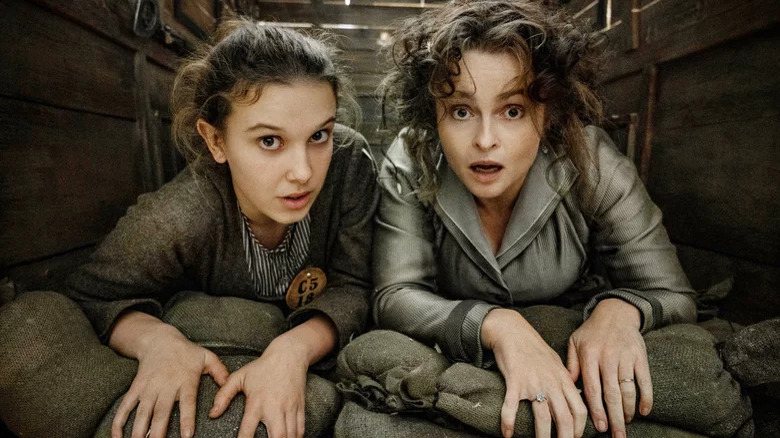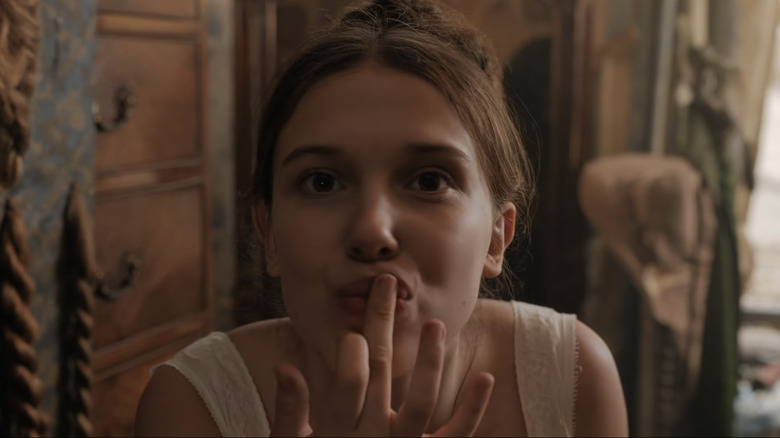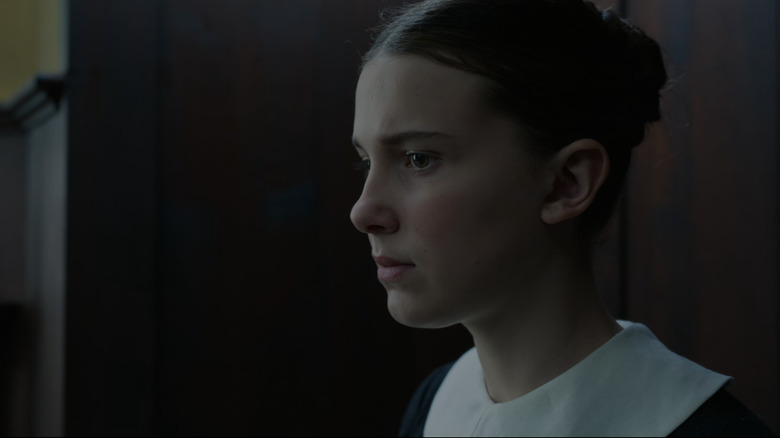The Weird Lawsuit Over Netflix's Enola Holmes, Explained
More and more pop culture figures are slipping into the public domain, allowing anyone to reinterpret beloved characters. In 2022, Winnie-The-Pooh entered the public domain, and our cherished childhood friend was made into a vicious slasher villain at the center of a humorless bloodbath of a film, "Winnie-The-Pooh: Blood And Honey." Meanwhile, Disney has so far managed to successfully prevent Mickey Mouse from entering the public domain despite the copyright partially expiring, while Superman and other iconic superheroes move closer and closer to becoming public IP.
In the case of another prominent pop culture figure, Sherlock Holmes, many of the stories featuring Sir Arthur Conan Doyle's famous detective entered the public domain some time ago. Copyright typically lasts for the duration of an author's life plus 70 years, 120 years from the date of their creation, or 95 years from their publication date — whichever comes soonest. Doyle passed away in 1930, and a lot of his Sherlock Holmes novels entered the public domain in the 20th Century, beginning in 1981 when 1887's "A Study in Scarlett" made the transition. So, by the time author Nancy Springer published her first "Enola Holmes" novel in 2006 — a novel based on the world established by Doyle — she was mostly in the clear.
In 2020, Netflix's first adaptation of a Springer book, "Enola Holmes" arrived, welcoming girls into the detective club and becoming a big enough hit for the streamer to green-light a sequel. When "Enola Holmes 2" debuted in 2022, it proved to be an even more charming mystery outing, firmly cementing these films as a solid new franchise for Netflix. All in all, then, a pretty nice little success story for the biggest streamer in the game. Or at least it would have been if it wasn't for that pesky copyright law.
The Conan Doyle Estate sued Netflix and others over Enola Holmes
Nancy Springer's "Enola Holmes Mysteries" series comprises nine books featuring the titular sister of the great Sherlock. The 14-year-old protagonist is an original creation of Springer's and the lead detective of these stories. She's played by "Stranger Things" star Millie Bobby in the Netflix adaptations, the first of which arrived in 2020. Adapting the first Enola Holmes novel, in which the eponymous detective embarks on a quest to solve the mystery of her mother's disappearance, "Enola Holmes" was a hit for Netflix, spawning a sequel which arrived on the streamer in 2022. Unfortunately, before the first movie was even released, Netflix, production company Legendary Pictures, publishing house Penguin Random House, and Springer herself were slapped with a lawsuit from the Conan Doyle Estate.
The complaint alleged that Springer and the other parties infringed copyright and trademark law with the "Enola Holmes" products, specifically stating (via The Guardian) that Sir Arthur Conan Doyle had created "significant new character traits for Holmes and Watson" in the 10 stories that remained protected by copyright law in the U.S. Back in 2014, a ruling made all the Sherlock Holmes stories authored prior to 1923 property of the public domain, allowing Springer and others to use the character and his world in their creations. But the 10 remaining stories, referred to in the 2020 lawsuit, were written between 1923 and 1927, meaning they were still covered by copyright law.
So, what exactly had Springer, Netflix, and the others infringed upon from these specific stories? Well, emotions, apparently
Are emotions protected under copyright law?
The 10 Sherlock Holmes stories that remained under copyright following the 2014 ruling, originally published in the 1927 collection "The Case-Book of Sherlock Holmes," finally entered the public domain on January 1, 2023. But that was too late to prevent the 2020 lawsuit, which alleged that the named parties used elements that were original to these last 10 stories, thereby constituting a violation of copyright law.
Specifically, the Conan Doyle Estate argued that, in the earlier stories, Sherlock Holmes was depicted as "aloof and unemotional," but in the later stories which remained under copyright protection, the detective was shown to be much more emotionally forthcoming. The lawsuit claimed this was due to Conan Doyle himself losing his son during World War One and his brother shortly after. Following these tragic events, the complaint claimed:
"It was no longer enough that the Holmes character was the most brilliant rational and analytical mind. Holmes needed to be human. The character needed to develop human connection and empathy [...] He became capable of friendship. He could express emotion. He began to respect women."
It was this more emotionally open Holmes with his "significant new character traits" that the lawsuit claimed Nancy Springer, Netflix, and the others had infringed upon. In the "Enola Holmes" film, specifically, Henry Cavill plays a kind-hearted Holmes akin to the later iteration of the character from Sir Arthur Conan Doyle's last Holmes novels. So basically, as the Estate saw it, unless you paid their licensing fee for the use of this later version of Holmes (like most of the other adaptations, including Guy Ritchie's great "Sherlock Holmes" movies, did), you were fair game for legal action.
The case against Netflix and co. was ultimately dismissed
To sum it up simply, then, the Conan Doyle Estate sued Netflix, Nancy Springer, Legendary Pictures, and Penguin Random House for depicting Sherlock Holmes as having emotions, something they claim he was only described as having in stories published between 1923 and 1927. At the time the "Enola Holmes" books were written and published and the Netflix adaptation was filmed, the copyright for these later Holmes stories had not expired, and so, argued the Estate, the named parties had infringed on their copyright.
As The Hollywood Reporter detailed in December 2020, Netflix, Legendary Pictures, and the other accused parties settled with the Conan Doyle Estate and "stipulated to dismissal of a lawsuit in New Mexico federal court." In a piece for Copyright Lately, Aaron Moss highlighted how this dismissal essentially means the question of whether emotions can be copyrighted remains unsolved, writing that, "The case was probably settled, although we don't know for sure." Other outlets reported that on December 18, 2020, Netflix "reached an undisclosed settlement" with the Estate, however.
In a motion to dismiss, filed in October of 2020, the defendants argued, "Copyright law does not allow the ownership of generic concepts like warmth, kindness, empathy, or respect, even as expressed by a public domain character — which, of course, belongs to the public, not Plaintiff." That seems like a perfectly reasonable response to the suit, but because the case was eventually dismissed we'll never know which argument ultimately won out. Also, as Moss explained, just because a case was dismissed doesn't mean there wasn't some sort of settlement agreed between the defendants and the complainant. In that sense, it's hard to say whether the Estate ultimately won out or not.
Netflix wasn't the only target of the Conan Doyle Estate
"Enola Holmes" first hit Netflix on September 23, 2020, so the Conan Doyle case was still ongoing when the film arrived, and remained ongoing for the film's first couple of months on the service. While there's no official statement from Netflix on the topic, the streamer surely wanted to get an idea of how well the film was going to perform before it made any attempts to settle the case. "Enola Holmes" did become one of the most-watched movies on Netflix in 2020, and with "Enola Holmes 2" being greenlit, the franchise is obviously a fairly successful one for the streamer. As such, the company was likely keen to settle with the Conan Doyle Estate to ensure it could move ahead with its burgeoning franchise unimpeded.
Interestingly enough, it seems the Conan Doyle Estate has always been fiercely protective of the author's work, and has never been afraid to get litigious. The Estate even sued Miramax in 2015 over the Sir Ian McKellan-starring "Mr. Holmes," in which an aged Sherlock tackles one last case. That case was also settled later that year.
No doubt the rumored Sherlock Holmes universe from Robert Downey Jr. and MAX, which may or may not materialize in the coming years, would have sent the Estate into a lawsuit frenzy. Alas, or thankfully depending on how you feel about it, Sherlock Holmes is now firmly in the public domain.




